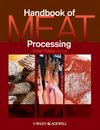Two Decades of Innovation
Story By Sam Gazdziak,
Senior Editor
Senior Editor
Any company that has been in the food-processing industry for 20 years must be doing something right. In the case of Carolina Turkeys, it built a reputation as being a low-cost producer, which is still a focus of the company. But it has never been afraid to change and adapt with the times.
Carolina Turkeys, headquartered in Mt. Olive, N.C., started as a producer of packaged, whole-body turkeys, but in the last decade, it has been moving further from that category. A few years ago, the company made the decision to stop harvesting 14-pound hens, which is the preferred bird, to produce the typical Thanksgiving dinner-type birds. Today, that whole-body bird represents only the smallest percentage of the company’s total production.
“I knew it was the direction I wanted to take, and ownership and the live partners supported it, so we moved on,” says C. Dan Blackshear, president and CEO of Carolina Turkeys. Blackshear has been with the company since 1994, and he has kept it evolving, culminating with the latest effort — taking on the case-ready market.
“We’re trying to maintain that low-cost producer [reputation] but yet become a marketing organization, where we build a brand and derive some of our income from our marketing and sales efforts, versus just being a low-cost producer.”
Carolina Turkeys had produced case-ready products before, mostly with bone-in items, but exited it in the late 1990s. “Originally in case-ready, we were just another company out there with fresh turkey in a tray,” Blackshear explains. The products, which were produced under the Carolina Turkey® brand, did reach a peak of 20 million pounds on an annualized basis by the time the company left the category. “The business, from a financial standpoint, did not generate the returns that we needed and wanted for the business.
“Now, we’re coming back,” he adds, “and we’re coming back with all-boneless, with premium products and premium position, and marketing support to go with a premium brand.”
Just a perfect brand name
The new product line includes fresh ground turkey, seasoned ground turkey, patties, sausages, breakfast links, tenders and deli meats. Frozen items include meatballs, fully cooked flavored strips, roast-in-bag breasts, both bone-in and boneless, and more. All the items are marketed under the Just Perfect® brand.
Just Perfect had been used by Carolina Turkeys previously, but not enough was done to promote the name, notes Raj Kaul, vice president of sales, marketing, research & development. “As far as the consumer goes, [the Just Perfect brand] didn’t exist. Part of our mission was to change all that.”
Kaul, who joined the company in late 2004, has experience in this segment of the industry. He worked for the Turkey Store for 14 years before it was bought by Hormel in 2001. In order to express his philosophy and his mission at Carolina Turkeys, he passed out copies of the book “Good to Great,” by Jim Collins, to every salesperson and top manager in the company. The book highlights those companies that once were good, but have changed into great companies. “We’re a very good company, and I want to make it a great one,” Kaul states. “Part of that, to me, is creating a great brand.”
Carolina Turkeys worked with an independent research agency on a name search and went through several packaging designs and looks. “We went through almost 800 names, and we came back to a name we actually owned, which I think is ironic,” Kaul says. “We said, ‘We’re trying to create a great product line, the best you can buy. What better name than Just Perfect?’”
Blackshear acknowledges that the Just Perfect tray-pack items, which have been available since last August, are entering a very crowded market. “There’s some good competition out there,” he says. “We’ve had to earn and work very hard to get the positioning we have in the stores we’re in, but we’re making progress and are enthusiastic that in the not-too-distant future, we’ll be able to meet our goals and make this a very successful business.”
Carolina Turkeys markets its products in the retail, deli and foodservice categories, as well as internationally. Carolina Turkeys management believes that retail is by far the quickest place to establish a brand. Blackshear calls the tray-pack items a beachhead for the brand. “You’ve got to go into retail if you want to become an established company, and other than whole-body turkeys, what products do you do it with in retail?” he asks. Because case-ready products are such a visible part of the turkey market, the brand had to be known in that segment to establish the Just Perfect name elsewhere.
To help its chances to succeed, Just Perfect packaging received special attention. The logo features a woman with her arms folded on top of the Just Perfect name. “That’s there for a reason, because most of our consumers, even today, are women,” Kaul says. While she doesn’t have a name, much of the advertising around the brand focuses on the Smart Mom. “Every mom cares about her family and her kids, and she does the best she can with her limited time. Our job is to make her life easier. If we can do that, we’ll have a great business,” he adds.
Complementing the gold logo is a swath of eye-catching purple on the package. It’s not a solid sheet of purple, and that’s by design. There is some movement and flow to it, to help it stand out. Further, research showed that purple, which tends to symbolize richness, royalty, and premium quality, stood out among female consumers.
To take it a step further, there is a cardboard wrap around the tray-pack items that can further communicate the message, show a picture of a prepared meal or include a recipe. “The packaging that we have, with the wrap, is expensive,” Kaul says. “We have competitors that don’t have wraps at all; they just have printed film, which is cheaper to produce, but it’s the extra step that we needed to complete our look.”
Good packaging, good product
The trick then was to make sure that the product inside the package matched the quality of the packaging itself. Fortunately, Carolina Turkeys had that covered. Some of the products were already available under the Carolina Turkey brand. Blackshear notes that over the company’s history, most of its retail and deli products were placed under that brand, which could cause some confusion among consumers. Carolina Turkey deli meats, for example, ranged from fully emulsified, mostly white-meat products to top-of-the-line turkey slices.
Carolina Turkeys now has a two-tier “go-to-market” strategy, led by the premium Just Perfect line of fresh tray-pack and frozen retail products, as well as a line of all-natural deli meats. “When you see Just Perfect, you know you’ve got outstanding quality, but they’re also at the top end as far as flavor, packaging and appearance, and it won’t ever include the lower, value products that are a part of all our marketing channels,” Blackshear says.
The mid-tier products are now marketed under the Carolina Turkey brand, which has also gone through a bit of a renovation. The logo used to include a picture of a whole turkey. “We’re not in that business anymore, so we changed the logo,” Kaul says. “There’s a farm scene on it now. It’s not radically different, but it’s different enough, and I think it shows a better look.”
Kaul estimates that Just Perfect products currently account for about 10 percent of Carolina Turkeys’ total sales. “Our long-term goal is to shift that balance,” he says. “We’ll always have Carolina Turkey as a brand, but we’re going to grow and emphasize the Just Perfect brand more. I expect that balance to be 50-50 within five years.”
Blackshear says that the case-ready market for turkey products is pretty mature, having been around for about 25 years. “What you’ve got to do is convince [retailers] that you can service it better, that you can grow the category, and you’ve got some different ideas where you can create some incremental growth for them,” he says.
The company’s goal, Kaul notes, was to do the “little things” better than the existing competition, whether it be better packaging, ingredients, shelf life or processing. The other idea was to create products unique to the market. One such item, Seasoned Ground Turkey, has a proprietary seasoning mix that compares well against other ground turkey or even lean beef, he explains. The taste is closer to a classic burger flavor than is typically available in the category.
“People buy ground turkey because it’s better for them, but they don’t buy it because it tastes great, generally speaking,” Kaul points out. “We’re trying to bridge that gap, by marketing products that actually taste good and are better for you, too.”
Carolina Turkeys has produced coupons, shelf-talkers, floor graphics and other such advertising options for retailers, but the packaging itself seems to be doing its job very well. “Most of our better customers today are seeing regular turn on this business without a whole lot of advertising, because the packaging is driving the consumption,” Kaul says.State of the turkey industry
As a whole, the turkey industry produces about 5.5 billion pounds annually on a ready-to-eat basis. Carolina Turkeys ranks No. 4 on the list of top processors, accounting for about 9 percent of the national production. Its 700,000-square-foot plant is the largest single-site turkey plant in the world.
In the 20 years Carolina Turkeys has been in existence, there have been several consolidations and start-ups in the industry, to where the amount of competition is currently basically stable. Unfortunately, another number that’s been stable during that time is the consumption of turkey in the country. “The growth that we get comes from growth of population or exports,” Blackshear says.
Although Americans may not be eating more turkey now than in the past, Blackshear says there are still ways to grow in the industry. Value-added products, different types of cuts and precooked products are a few ways to boost sales. Last year, Carolina Turkeys’ sales grew to just over $500 million.
“There are lots of ways to grow a business without doing more pounds, and I think our company is a great example of that,” he says. “Our dollar sales have grown more than twice as fast as our poundage. That’s growth.”
Celebrating 20 years
As if working on promoting the new brand of products wasn’t enough, Carolina Turkeys also has a few plans to celebrate its 20th anniversary. Blackshear says that the company wants to celebrate with its customers and associates, as well as the community around Mt. Olive. With a payroll of about $75 million, Carolina Turkeys is the largest employer in Duplin County, N.C.
“We have to tell the positive side of our story, and the 20th anniversary gives us a reason for celebrating and telling the business and social community who we are and what we do,” he says.
In addition, about 70 of the company’s estimated 2,500 employees have been there since the very beginning, and those longtime employees will be recognized for their commitment this year.
To Kaul, one of Carolina Turkeys’ biggest strengths is the people, both on the production floor and in the office. “The key to greatness is getting the right people in the right seats on the right bus,” he says. “We’re building a great team. You can’t have a great company without great people, with a common vision. That is the essence of it, to me.” NP



